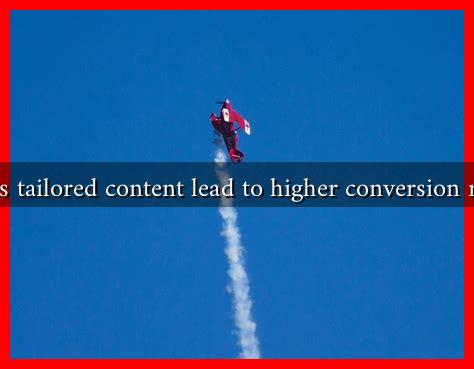-
Table of Contents
Does Tailored Content Lead to Higher Conversion Rates?
In the digital age, where consumers are bombarded with information, the importance of tailored content cannot be overstated. Businesses are increasingly recognizing that personalized content can significantly enhance user engagement and drive conversion rates. But does tailored content truly lead to higher conversion rates? This article delves into the nuances of personalized content, supported by research, case studies, and statistics.
The Power of Personalization
Personalization refers to the practice of creating content that is specifically designed to meet the needs and preferences of individual users. This can include everything from personalized email marketing campaigns to customized website experiences. The rationale behind tailored content is simple: when users feel that content speaks directly to them, they are more likely to engage and convert.
Statistics That Speak Volumes
Numerous studies have shown the effectiveness of tailored content in boosting conversion rates. Here are some compelling statistics:
- According to a study by Econsultancy, 74% of marketers say that targeted personalization increases customer engagement.
- A report from Statista indicates that 80% of consumers are more likely to make a purchase when brands offer personalized experiences.
- Research by Forbes found that personalized emails have an open rate of 29% compared to 19% for non-personalized emails.
Case Studies: Success Stories of Tailored Content
Several companies have successfully implemented tailored content strategies, leading to impressive conversion rates. Here are a few notable examples:
- Amazon: Amazon’s recommendation engine is a prime example of tailored content in action. By analyzing user behavior and purchase history, Amazon provides personalized product recommendations, which account for 35% of the company’s total sales.
- Netflix: Netflix uses sophisticated algorithms to recommend shows and movies based on user preferences. This personalization has been credited with keeping subscribers engaged, resulting in a 93% retention rate among users who engage with personalized recommendations.
- Spotify: Spotify’s “Discover Weekly” playlist curates music based on individual listening habits. This feature has significantly increased user engagement, with over 40 million users listening to their personalized playlists each week.
How Tailored Content Enhances Conversion Rates
Tailored content enhances conversion rates through several mechanisms:
- Relevance: Personalized content resonates more with users, making them feel understood and valued.
- Engagement: Users are more likely to interact with content that is relevant to their interests, leading to higher engagement rates.
- Trust: When brands provide personalized experiences, they build trust and loyalty among consumers, which can lead to repeat purchases.
- Reduced Friction: Tailored content can streamline the user journey by presenting relevant options, reducing the time and effort needed to make a decision.
Challenges and Considerations
While the benefits of tailored content are clear, businesses must also navigate certain challenges:
- Data Privacy: With increasing concerns over data privacy, companies must ensure they are transparent about how they collect and use consumer data.
- Implementation Costs: Developing a robust personalization strategy can require significant investment in technology and resources.
- Content Management: Maintaining a consistent and relevant personalized experience across multiple channels can be complex.
Conclusion
In conclusion, tailored content has proven to be a powerful tool for enhancing conversion rates. By delivering personalized experiences, businesses can engage users more effectively, build trust, and ultimately drive sales. However, it is essential to approach personalization thoughtfully, considering data privacy and implementation challenges. As the digital landscape continues to evolve, companies that prioritize tailored content will likely find themselves at a competitive advantage.
For more insights on personalization in marketing, consider exploring resources from HubSpot and MarketingProfs.

